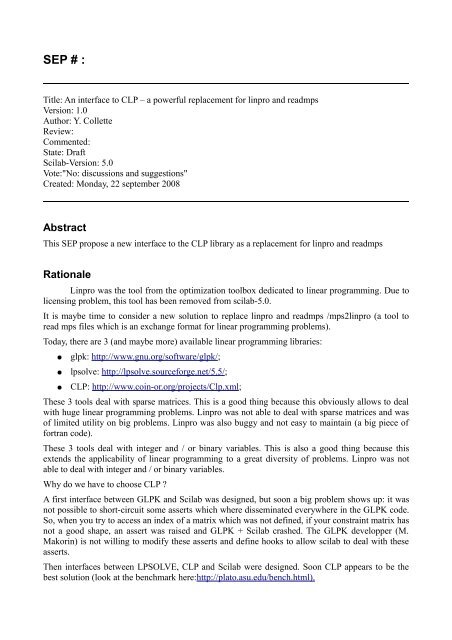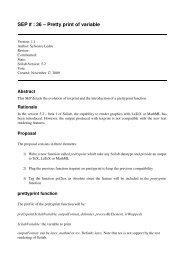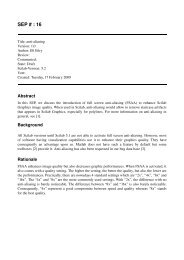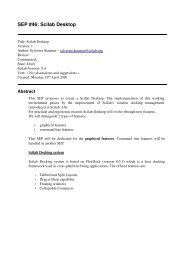SEP # : - Scilab
SEP # : - Scilab
SEP # : - Scilab
Create successful ePaper yourself
Turn your PDF publications into a flip-book with our unique Google optimized e-Paper software.
<strong>SEP</strong> # :<br />
Title: An interface to CLP – a powerful replacement for linpro and readmps<br />
Version: 1.0<br />
Author: Y. Collette<br />
Review:<br />
Commented:<br />
State: Draft<br />
<strong>Scilab</strong>-Version: 5.0<br />
Vote:"No: discussions and suggestions"<br />
Created: Monday, 22 september 2008<br />
Abstract<br />
This <strong>SEP</strong> propose a new interface to the CLP library as a replacement for linpro and readmps<br />
Rationale<br />
Linpro was the tool from the optimization toolbox dedicated to linear programming. Due to<br />
licensing problem, this tool has been removed from scilab-5.0.<br />
It is maybe time to consider a new solution to replace linpro and readmps /mps2linpro (a tool to<br />
read mps files which is an exchange format for linear programming problems).<br />
Today, there are 3 (and maybe more) available linear programming libraries:<br />
●<br />
●<br />
●<br />
glpk: http://www.gnu.org/software/glpk/;<br />
lpsolve: http://lpsolve.sourceforge.net/5.5/;<br />
CLP: http://www.coin-or.org/projects/Clp.xml;<br />
These 3 tools deal with sparse matrices. This is a good thing because this obviously allows to deal<br />
with huge linear programming problems. Linpro was not able to deal with sparse matrices and was<br />
of limited utility on big problems. Linpro was also buggy and not easy to maintain (a big piece of<br />
fortran code).<br />
These 3 tools deal with integer and / or binary variables. This is also a good thing because this<br />
extends the applicability of linear programming to a great diversity of problems. Linpro was not<br />
able to deal with integer and / or binary variables.<br />
Why do we have to choose CLP ?<br />
A first interface between GLPK and <strong>Scilab</strong> was designed, but soon a big problem shows up: it was<br />
not possible to short-circuit some asserts which where disseminated everywhere in the GLPK code.<br />
So, when you try to access an index of a matrix which was not defined, if your constraint matrix has<br />
not a good shape, an assert was raised and GLPK + <strong>Scilab</strong> crashed. The GLPK developper (M.<br />
Makorin) is not willing to modify these asserts and define hooks to allow scilab to deal with these<br />
asserts.<br />
Then interfaces between LPSOLVE, CLP and <strong>Scilab</strong> were designed. Soon CLP appears to be the<br />
best solution (look at the benchmark here:http://plato.asu.edu/bench.html).
This benchmark underlines that CLP was a better free tool for linear programming than both GLPK<br />
and LPSOLVE. Better than this, CLP is a commercial tool from IBM (OSL) which has been turned<br />
into opensource projects in 2004. If you want more informations concerning CLP, see<br />
https://projects.coin-or.org/Clp/wiki/FAQ.<br />
CLP is a valuable tool. See the success stories: https://projects.coin-or.org/Clp/wiki/SuccessStories<br />
CLP is able to deal with sparse matrices, CLP has a built in support for reading and writing mps<br />
files. CLP is actively supported by a community and IBM. CLP is open source and CLP is a C++<br />
library (easier to maintain than the fortran linpro).<br />
The interface to scilab is currently in C++ and is now stable enough to load and solve tests from the<br />
lplib (http://wpweb2.tepper.cmu.edu/fmargot/mps.html) and miplib (http://miplib.zib.de/).<br />
Be careful, these sets of instances are sometimes infeasible (we need to know what is the behavior<br />
of a solver faced to an infeasible instance) and sometimes extremely difficult to solve (and thus they<br />
require other solving strategy like branch and cut – see the CBC library on the coin-or website 1 ).<br />
This preliminary interface can be found here: http://code.google.com/p/scilab-mip/<br />
With this interface will come another interface to readmps. This function has been splitted into 2<br />
parts: a first function called read_mps_file which returns only the informations related to the size of<br />
the problem. If the problem is loadable into scilab (not too big), then we can call read_mps_file_MP<br />
which returns all the data related to the problem. The sparse matrix of constraints, the vector of<br />
coefficients of the objective function, etc ...<br />
Today, the readmps functions are based on the glpk interface but will be switched to the CLP<br />
interface to have the support for read / write mps files.<br />
Example Usage<br />
// A LP example which defines A as a sparse matrix<br />
printf('Solve problem with sparse matrix\n');<br />
// c the objective function coefficients<br />
// a the constraint matrix coefficients<br />
// b the bounds of the constraints<br />
c = [0 0 0 -1 -1]';<br />
a = sparse([-2 0 0 1 0;...<br />
0 1 0 0 2;...<br />
0 0 1 3 2]);<br />
b = [4 12 18]';<br />
// lb the vector of lower bounds<br />
// ub the vector of upper bounds<br />
lb = [0,0,0,0,0]';<br />
ub = 100*[1,1,1,1,1]';<br />
// vartype the kind of variables. I stands for integer.<br />
vartype = 'IIIII'; // All the variables are integer<br />
1 The CBC library is used in mathematica. See https://projects.coin-or.org/Cbc/wiki/SuccessStories
in the param structure, parameters related to the behavior of clp are set<br />
param = init_param();<br />
param = add_param(param,'maxnumiterations',10000);<br />
param = add_param(param,'maxnumseconds',10000);<br />
param = add_param(param,'primaltolerance',1e-7);<br />
param = add_param(param,'dualtolerance',1e-7);<br />
param = add_param(param,'verbose',1);<br />
param = add_param(param,'solver',1); // 3 interior - other simplex<br />
param = add_param(param,'optim_dir', 1); // optimisation direction:<br />
// 1 - minimize, -1 - maximize, 0 - ignore<br />
[xmin,lambda,status] = clp([],c,a,b,[],[],lb,ub,vartype,param);<br />
// The first argument of clp is a sparse quadratic matrix.<br />
// CLP can solved quadratic problems.<br />
// xmin is the solution found by clp<br />
// lambda is the vector of Lagrangian coefficients<br />
// status is an integer indicating how has ended the optimization<br />
printf('solution found: \n');disp(xmin);<br />
printf('status = %d\n',status); disp(lambda);<br />
Changelog<br />
1.0 – Initial version<br />
Copyright<br />
This document has been placed under the license CeCILL-B.







